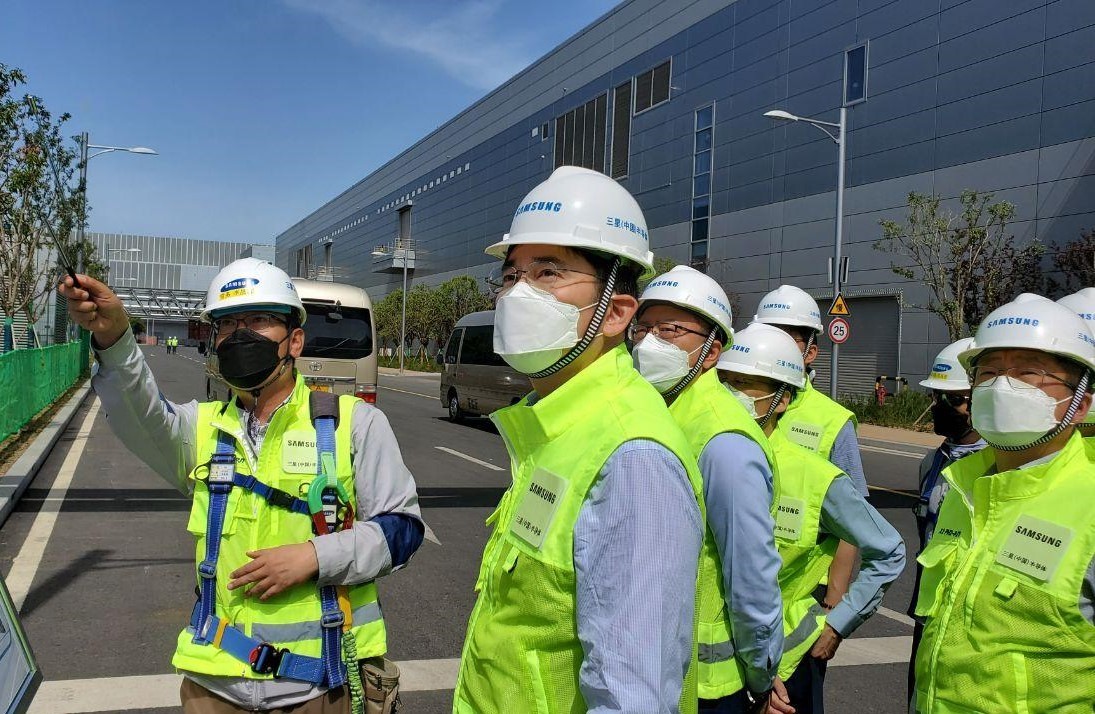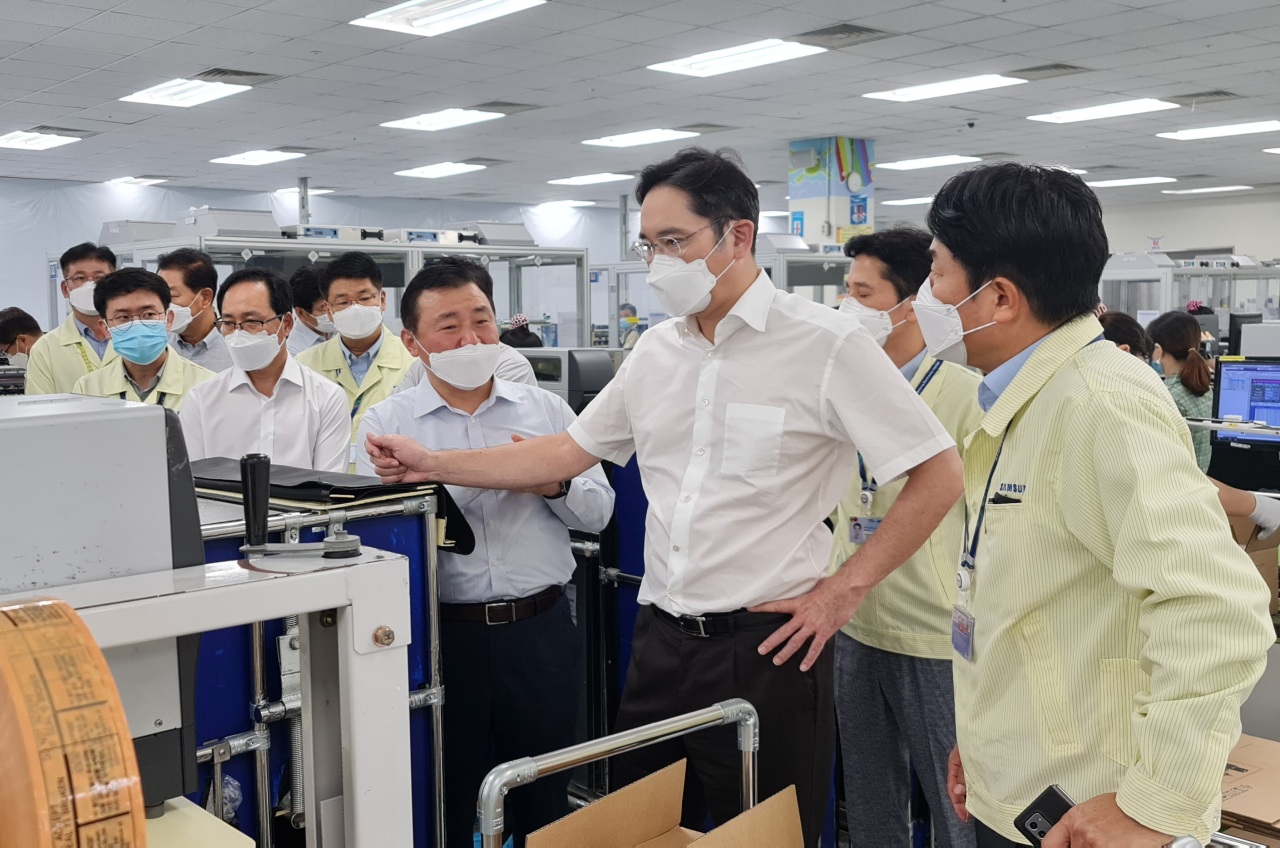 |
Samsung Electronics Vice Chairman Lee Jae-yong checks the company's chip plant in Xian, China, in 2020. (Samsung Electronics) |
Samsung Group’s de facto chief Lee Jae-yong attended a court hearing on Thursday as part of an ongoing trial on alleged irregularities surrounding his ascension to the helm of the South Korean tech conglomerate.
As always, the tycoon, who is serving a 2 1/2-year jail term over a previous bribery conviction, didn’t utter a single word throughout the full-day session held at the Seoul Central District Court, as his attorneys fought hard to fend off additional convictions. The charges brought against him include stock market manipulation, accounting fraud and breach of trust.
South Korean leaders have been mulling ways to release him early from jail. Samsung, whose exports of chips, display panels and tech products buttress the local economy, needs him back at its helm to navigate through a new global economic war raging over chip leadership, those calling for his early release say.
“A public consensus seems to be building on the need for Lee’s release,” Rep. Song Young-gil, leader of the ruling Democratic Party said recently, heightening the expectation for Lee’s release. The politician suggested granting him parole, if not a presidential pardon, to let him out.
While the right to grant a pardon lies solely with the president, a parole can be decided by the justice minister.
Pardoned or paroled, Lee won’t be completely free of legal risks.
He now faces potential imprisonment stemming from the suspicion that his inheritance of control over Samsung from his late father Chairman Lee Kun-hee was paved with illegality. Samsung has undertaken a series of equity transactions and activities after the senior Lee collapsed in 2014. This organizational scheme is known as Project G.
Thursday’s hearing, the fifth since the trial began on April 22, saw Samsung lawyers question the first witness, a former leader of Samsung Securities’ corporate M&A advisory team. The prosecutors had questioned the witness for the past two sessions last month.
The witness was involved in Project G at requests of Samsung’s former control tower Future Strategy Office, which included the controversial mergers of Samsung Everland with Cheil Industries in 2014 and Samsung C&T with Cheil Industries in 2015.
The prosecutors claim that the witness was deeply involved in the project and had been aware of the purposes of the mergers, which were planned entirely in the interest of facilitating Lee’s power inheritance.
Some emails written by the witness in 2014 and 2015 and some sent by former officials at Future Strategy Office, which were submitted to the court as evidence, showed that the former Samsung officials meticulously gauged the timing of business activities related to the transactions. The missives also detailed efforts that induced the 1:0.35 merger ratio for the Cheil and C&T merger.
The prosecutors asserted that all of the circumstances seem to be made with an ultimate goal of reinforcing the junior Lee’s grip on the Samsung empire.
Samsung’s legal representatives, on the other side of the fence, focused on inducing testimonies that the project was created for the overall stability of Samsung Group.
Regarding the Project G document submitted by prosecutors as a key piece of evidence, the witness said, “The report was written for the purpose of contributing to maintaining the overall competitiveness of Samsung Group.”
Mulling measures to maintain and stabilize the owner family’s leadership, including possible inheritance of the chairman’s stake in Samsung affiliates to the heirs, was only supplementary, he said.
To the question of “What did the word inheritance mean to you at the time?” the witness said, “It meant to me maintaining the group’s overall management rights of the large shareholders. And I did not think about issues of individual shareholders.”
Even if Lee is released, some say it is likely in August, either on a special pardon or parole, Samsung will still face leadership uncertainty stemming from Lee’s ongoing trial, industry watchers say.
Among others, the controversy over Lee’s employment status would continue, if he is released on the condition of parole.
Due to the bribery conviction, Lee is legally banned from being employed by the company in relation to his conviction for five years, according to the country’s Act on Aggravated Punishment of Specific Economic Crimes.
If the Samsung leader is pardoned, he will not be restricted to the employment ban.
 |
Lee checks out at smartphone products at Samsung's plant in Hanoi, Vietnam in 2020. (Samsung Electronics) |
Legal experts forecast that the ongoing trial on the leadership inheritance allegations would take three to five years for the court to make its first ruling.
Both sides have requested more than 250 witnesses for testimonies.
“It is difficult to say all of the legal risks on Samsung would disappear, if Lee is released,” said an industry source. “However, the current trial is about an issue that involves complex corporate financial affairs and business activities, which can be interpreted from multiple different perspectives, so there is room for contention.”
The problem extends further beyond Samsung. South Korean family-run conglomerates all face similar risks stemming from their owner family, experts said.
“Due to the prominent ownership-centered corporate governance in Korea, it is hard to block owners’ risks on their companies in general,” said Ahn Sang-hee, head of corporate governance team at Daishin Economic Research Institute. “Existence of owners is crucial for companies’ future business plans and strategies, although they do not actually play a role in everyday business activities.”
On the Samsung issue, Ahn said: “Because the semiconductor business is cycle-based, the owner’s role would be limited, but a long period of owner’s absence could be another risk for Samsung for its long-term business.”
By Song Su-hyun (
song@heraldcorp.com)





![[Weekender] Korea's traditional sauce culture gains global recognition](http://res.heraldm.com/phpwas/restmb_idxmake.php?idx=644&simg=/content/image/2024/11/21/20241121050153_0.jpg)



